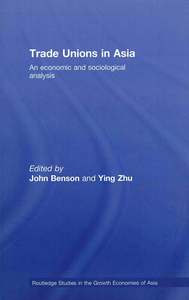Trade unions in Singapore: corporatist paternalism
Leggett, Chris (2008) Trade unions in Singapore: corporatist paternalism. In: Benson, John, and Zhu, Ying, (eds.) Trade Unions in Asia: an economic and sociological analysis. Routledge Studies in the Growth Economies of Asia, 84 . Routledge, Milton Park, UK, pp. 102-120.
![[img]](https://researchonline.jcu.edu.au/16072/7.hassmallThumbnailVersion/16072_Leggett_2008_Cover_.jpg)
|
Image (JPEG) (Book Cover)
- Cover Image
Download (246kB) |
|
|
PDF (Published Version)
- Published Version
Restricted to Repository staff only |
Abstract
[Extract] Singapore has been described as an 'administrative state' (Chan 1975), and its governance as 'the management of compliance' (Wilkinson and Leggett 1985). It is a state whose People's Action Party (PAP) leaders have established a mode of institutional social control - labelled 'bureaucratic authoritarian corporatism' by Deyo (1981) - and proclaimed 'pragmatism' as their party's ideology. Since the 1980s there has been a softening of the exercise of social control. For example, Singapore workers who were chided in the early 1980s for 'job hopping' (Straits TImes 14 September 1981), in the late 1990s were urged to become mobile (Ministry of Manpower 1999).
Almost 50 years ago the PAP was elected to government in Singapore and immediately set about regulating industrial relations to meet the requirements for industrialization, an example of its pragmatic approach to governance in the state, including the management of industrial relations. Since then, there have been three transformations - morphological changes in which residual elements of the previous state remain discernible in the new - of Singapore's industrial relations. The first transformation, from 1960 to 1967 was from regulation by colonial administrators (Kerr et al. 1960) to the regulation of a plurality of industrial relations parties by the post-colonial PAP government. The second transformation, from 1968 to 1978, was from regulated pluralism to corporatist industrial relations, in which the trade union movement became an adjunct to the government's imperatives for Singapore's economy. The third transformation, from 1979 to 1986, saw a shift to paternalism by the government and the incorporated institutions of industrial relations. Since 1986, there has been a progression (rather than a transformation) from 'industrial relations' towards 'manpower planning' (Leggett 2007). Following Hyman's typology (Gospel, Chapter 2 this volume), with the second transformation, Singapore's trade unions moved away from their confrontational class direction under the colonial regime towards a collaborative social partnership under PAP hegemony, but with market goals stressed as national imperatives.
| Item ID: | 16072 |
|---|---|
| Item Type: | Book Chapter (Research - B1) |
| ISBN: | 978-0-415-41007-6 |
| Keywords: | trade unions, Asia, Singapore, industrial relations, corporatism |
| Date Deposited: | 28 Jul 2011 07:00 |
| FoR Codes: | 14 ECONOMICS > 1402 Applied Economics > 140211 Labour Economics @ 100% |
| SEO Codes: | 91 ECONOMIC FRAMEWORK > 9104 Management and Productivity > 910401 Industrial Relations @ 100% |
| Downloads: |
Total: 521 Last 12 Months: 4 |
| More Statistics |



